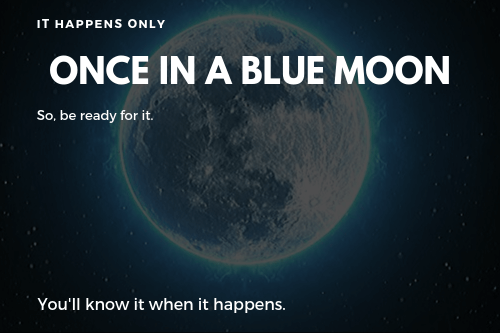
YouTube / iTunes / Spotify / Radio Public / Pocket Casts / Google Podcasts / Breaker / Overcast
Listen to ArtisanEnglish.jp posts & lesson intros here.
Phrase: Once in a blue moon
The phrase once in a blue moon means that something occurs infrequently or very rarely.
The strange thing is, though, that blue moons – real blue moons – themselves regularly occur every two and a half to three years.
Oh, and I should mention that blue moons are not even blue.
How’s that?
The longer I teach English, the more I come to believe it’s the strangest language in the world.
It seems that half of the things we say make absolutely no sense at all.
To speakers of other languages, it must seem as if English is some secret code, but even if you know the rules (grammar) hidden within the words is another meaning that only members of the individual culture understand.
Anyways, as I was saying, native English speakers use the phrase once in a blue moon to refer to things which happen exceptionally rarely.
If you are a baseball fan, you’ll know that the Orix Buffaloes win the Pacific League pennant race only once in a blue moon.
There was a time when super typhoons and extreme rainfall events only occurred in Japan once in a blue moon.
However, with the advancement of climate change, it seems that every other month, there is a major record-breaking weather event.
So, when exactly is the next blue moon?
Well, a blue moon occurs when there are 13 full moons in a year instead of 12.
It has to do with the number of days in a full moon cycle compared with the number of days in a calendar year.
The next blue moon is going to be on August 31, 2020.
Flesch-Kincaid Readability Test
This post is understandable by someone with at least a 7th-grade education (age 12).
On the Flesch-Kincaid reading-ease test, this post scores 72.
The higher the score on a scale of 0 – 100, the easier the passage is to read.

